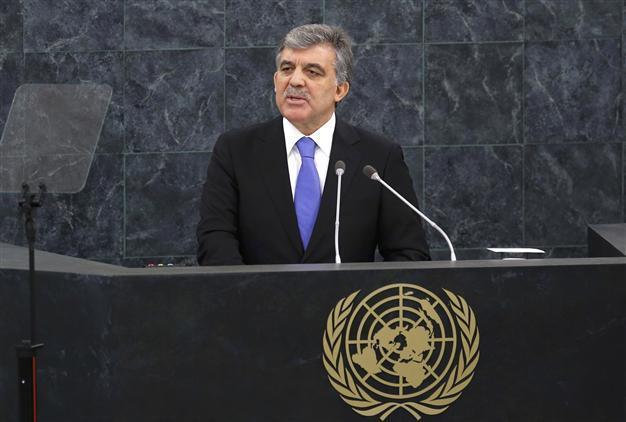UN's failure on Syria a disgrace, says Turkish President Gül
NEW YORK

Turkey's President Abdullah Gul addresses the 68th United Nations General Assembly at U.N. headquarters in New York, Sept. 24. REUTERS photo
It is a "disgrace" that the United Nations Security Council has failed to uphold its primary responsibility in the Syrian crisis, President Abdullah Gül said at the U.N. General Assembly Sept. 24, noting that it was regrettable that political differences had prevailed over the imperative to end the tragedy.
"Syria, a great country and a great nation, is consuming itself. It is a disgrace that the [Security Council] has failed [it]," he said.
Taking the floor after U.S. President Barack Obama urged the world to enforce a ban on Syria's chemical weapons, Gül lamented the U.N.'s inertia.
"We all need a strong, efficient, and credible U.N. We need a U.N. fit for purpose in the face of current global realities. The U.N. of which I speak should be a body capable of taking action to maintain international peace and security. It should be able to safeguard security, justice, and people's fundamental rights and freedom," the president added.
"It should never forfeit its prime responsibility for the sake of power politics. We must realize that inaction by the Security Council only emboldens aggressive regimes. We need a U.N. capable of forcing the perpetrators of brutal actions to submit to justice and the rule of law," Gül also said, urging a reform of the U.N.'s structure and openly criticizing the world body.
"Only through such a U.N. can we achieve the truly peaceful world envisioned by this institution's founders. Decisive action is the only way that the U.N. system will remain relevant and credible. To face this new reality, we need a Security Council which is truly democratic, representative, effective, and accountable," Gül said, adding that he Turkey welcomes and firmly supports the U.S.-Russian agreement to eliminate Syria's arsenal of chemical weapons.
"It is deeply regrettable that political differences, balance-of-power politics, and geopolitical considerations have prevailed over the imperative to end this tragedy," he told the audience.
"In short, we cannot and shall not leave the Syrian people to their fate. The burden of ending Syria's plight now rests on the shoulders of the international community. Strong words of support must now be matched by real deeds," Gül said.
'Need of a comprehensive strategy'The Turkish president expressed his support for the U.S.-Russian agreement for the destruction of Syria's chemical weapons arsenal, while also adding that the world should not turn a "blind eye" to those who died by the use of conventional weapons.
"Let me be clear, Turkey welcomes and supports the U.S.-Russian agreement. That agreement has to be translated into a tangible U.N. Security Council resolution ... The international community is turning a blind eye to the deaths of more than 100,000 people," Gül said, emphasizing that the agreement should not be a "substitute" for a comprehensive strategy.
"The chemical weapons agreement must not avoid the regime taking responsibility for its other crimes," Gül added, warning that the number of deaths may "double" if the United Nations fails to take immediate and concrete steps.
"This conflict neither began with the use of chemical weapons, nor will it end with an agreement to eliminate them," he said.
Extremism threatGül also stressed his opinion that further delays in taking comprehensive steps would reinforce extremists groups in Syria.
"Once extremist groups take root in a state, they form autonomous structures and become a real threat to security, not only at home but also abroad. In the end, dissolving such organizations presents the greatest challenge to restoring security in a country. We must be aware of this threat and realize that with each day we lose in indecision, the more remote the prospects for a peaceful Syria become," he said.
